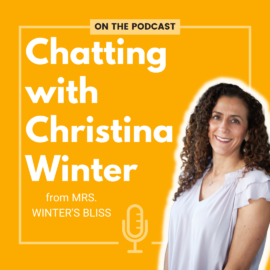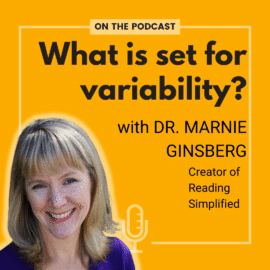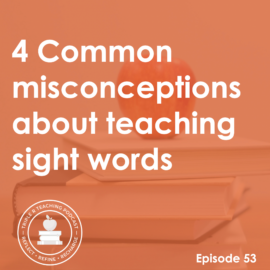
TRT Podcast#56: Introducing a new series: Reacting to Fountas and Pinnell
Fountas and Pinnell are big names in the field of literacy education. But for years they’ve been accused of advocating methods that do not align with reading research. Fountas and Pinnell have finally responded to this criticism in a 10-part blog series called “Just to Clarify.” This episode is the introduction to a 10-part series in which I respond to their blogs, one by one. It’s my first “reaction” series, and I’m excited! I hope you are too.
Listen to the episode here
Full episode transcript
Hello, and welcome to Episode 56 of Triple R Teaching, this is Anna Geiger here from The Measured Mom. In this episode, I'd like to introduce an exciting new series that we're going to start next week. It will be a ten part series in which we examine some comments made by two prominent names in literacy education, Irene Fountas and Gay Su Pinnell.
If you're at all familiar with the guided reading levels A, B, C, D, E, etc., then you're connected in some way to Fountas and Pinnell because they were the creators of that leveling system. Many, many schools in the United States in particular use the Fountas and Pinnell reading program.
For many years, I was a huge fan of Fountas and Pinnell! I bought every book they had. I loved their books because they got me excited about teaching reading and showed me ways to get students excited about reading as well! However, after I learned about the science of reading and structured literacy, I realized that their core belief, which has to do with how students read words, especially beginning readers, was in conflict with what I had learned about how the brain learns to read and how we store words for future instant retrieval. Since that time, I've really realized that much of what I've learned from Fountas and Pinnell I can't trust because it starts with the wrong foundation.
Now, really quickly, we can talk about who Fountas and Pinnell are. Irene Fountas is a professor at Lesley University in Massachusetts and Gay Su Pinnell is Professor Emerita at Ohio State. The main concern that people have raised to Fountas and Pinnell is their embracing of three-cueing, which is this idea that students use different cues to help them solve words as they read, particularly beginning readers. And so these students are learning to read using leveled books with words they can't necessarily sound out, but they can use the context or maybe a letter of the word to figure out what they must be. This is a core piece of balanced literacy, which is what I was in for a good twenty years.
I don't think everything about balanced literacy is bad, but three-cueing is definitely a rotten apple. The problem is that even though people have brought all these things to Fountas and Pinnell, they've kind of just dug in their heels. They haven't really engaged in much conversation and they certainly have not denounced three-cueing.
They've recently put out a series of blog posts with audio called "Just to Clarify." In that series, they answer ten questions that have been posed to them in the midst of, as some people would call it, the current "Reading Wars," we could also call it the discussion about the science of reading.
So here are the questions that they answer in their series:The first question is two-part: Why have you chosen not to participate in the latest debate about how to teach reading? What advice do you have for teachers who feel caught in the crossfire while this debate intensifies?
Number two: Can you clarify what MSV (that's three-cueing) is and why you believe it's important?
Number three: Some have suggested you support the use of guessing, can you comment on that?
Number four: How does guided reading and the use of leveled texts advance the literacy learning of children? What role does guided reading play in a comprehensive literacy system?
Number five: In your view of early literacy development, what is the role of decodable texts?
Number six: Could you speak to the role of phonics and teaching children to read, and clarify your approach to phonics instruction?
Number seven: Some people have referred to your work as "balanced literacy" or "whole language." Are these labels accurate?
Number eight: What do you mean by "responsive teaching" and why is it important?
Number nine: Elevating teacher expertise has always been a hallmark of your work. What has led you to advocate so strongly that teachers are the single most important factor in a child's learning achievement?
And finally, number ten: Much has been said about the role of teachers in teaching children how to read, but what role do school administrators, coaches, and other teacher leaders play?
Now, much has been written already in response to these blog posts. One person who has responded is Emily Hanford. You might remember that she was the author of "At a Loss for Words," which first kind of forced me to address the science of reading and structured literacy and start to figure out what the real story was there. Also Mark Seidenberg, who's the author of "Language at the Speed of Sight," in which he talks about how three-cueing is not what works to help children to read (plus a whole lot of other things). Both of them have been very disappointed by the blog series.
In fact, Mark Seidenberg said this, "Fountas and Pinnell clarified for me they haven't changed at all. They illustrate they still don't get it, that they're still part of the problem. These folks just haven't really benefited much from the ongoing discussion about what are the best ways to teach kids to read so that the most kids succeed."
I was reading somewhere else where someone wrote about this and they said it felt like Fountas and Pinnell's legs were stuck in concrete, they just wouldn't move.
Well, is that true? Is that really what they're saying in their series, that they don't care about the science of reading or structured literacy, and they are just going to hold fast to what they think works? We're going to examine that in the next ten episodes. In each episode, I'm going to share a little bit from their answer to each question and then give my response based on what I've learned from the science of reading, that is the research about how we learn to read.
You can find links to their blog posts as well as responses from Emily Hanford and Mark Seidenberg in the show notes for this episode, which you can find at themeasuredmom.com/episode56. Thanks for listening, and we'll see you next week.
Sign up to receive email updates
Enter your name and email address below and I'll send you periodic updates about the podcast.
Related resources
- Fountas & Pinnell’s series: Just to Clarify
- Emily Hanford’s response: Influential authors Fountas and Pinnell stand behind disproven reading theory
- Mark Seidenberg’s response: Clarity about Fountas and Pinnell







Leave a Comment